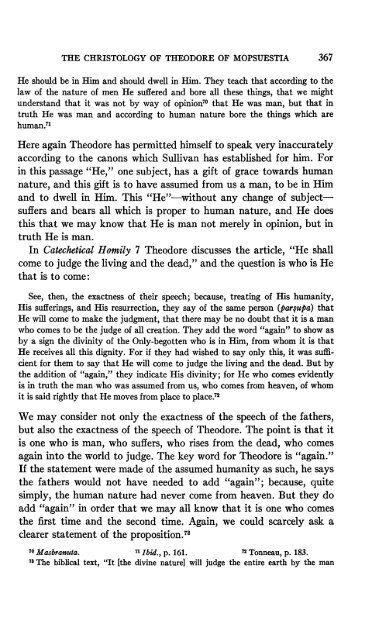ANNOTATIONS ON THE CHRISTOLOGY OF THEODORE OF ...
ANNOTATIONS ON THE CHRISTOLOGY OF THEODORE OF ...
ANNOTATIONS ON THE CHRISTOLOGY OF THEODORE OF ...
Create successful ePaper yourself
Turn your PDF publications into a flip-book with our unique Google optimized e-Paper software.
<strong>THE</strong> <strong>CHRISTOLOGY</strong> <strong>OF</strong> <strong>THE</strong>ODORE <strong>OF</strong> MOPSUESTIA 367<br />
He should be in Him and should dwell in Him. They teach that according to the<br />
law of the nature of men He suffered and bore all these things, that we might<br />
understand that it was not by way of opinion 70 that He was man, but that in<br />
truth He was man and according to human nature bore the things which are<br />
human. 71<br />
Here again Theodore has permitted himself to speak very inaccurately<br />
according to the canons which Sullivan has established for him. For<br />
in this passage "He," one subject, has a gift of grace towards human<br />
nature, and this gift is to have assumed from us a man, to be in Him<br />
and to dwell in Him. This "He"—without any change of subject—<br />
suffers and bears all which is proper to human nature, and He does<br />
this that we may know that He is man not merely in opinion, but in<br />
truth He is man.<br />
In Catechetical Homily 7 Theodore discusses the article, "He shall<br />
come to judge the living and the dead," and the question is who is He<br />
that is to come:<br />
See, then, the exactness of their speech; because, treating of His humanity,<br />
His sufferings, and His resurrection, they say of the same person (parsupa) that<br />
He will come to make the judgment, that there may be no doubt that it is a man<br />
who comes to be the judge of all creation. They add the word "again" to show as<br />
by a sign the divinity of the Only-begotten who is in Him, from whom it is that<br />
He receives all this dignity. For if they had wished to say only this, it was sufficient<br />
for them to say that He will come to judge the living and the dead. But by<br />
the addition of "again," they indicate His divinity; for He who comes evidently<br />
is in truth the man who was assumed from us, who comes from heaven, of whom<br />
it is said rightly that He moves from place to place. 72<br />
We may consider not only the exactness of the speech of the fathers,<br />
but also the exactness of the speech of Theodore. The point is that it<br />
is one who is man, who suffers, who rises from the dead, who comes<br />
again into the world to judge. The key word for Theodore is "again."<br />
If the statement were made of the assumed humanity as such, he says<br />
the fathers would not have needed to add "again"; because, quite<br />
simply, the human nature had never come from heaven. But they do<br />
add "again" in order that we may all know that it is one who comes<br />
the first time and the second time. Again, we could scarcely ask a<br />
clearer statement of the proposition. 73<br />
70 Masbranuta.<br />
71 Ibid., p. 161.<br />
n Tonneau, p. 183.<br />
73 The biblical text, "It [the divine nature] will judge the entire earth by the man
















